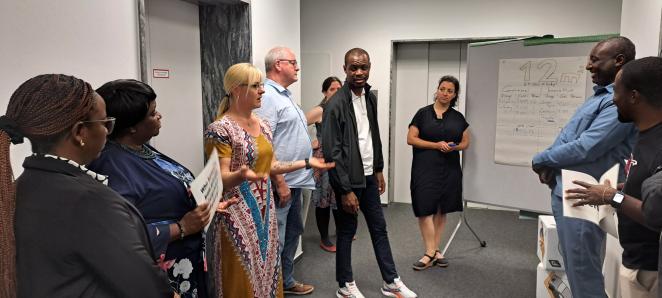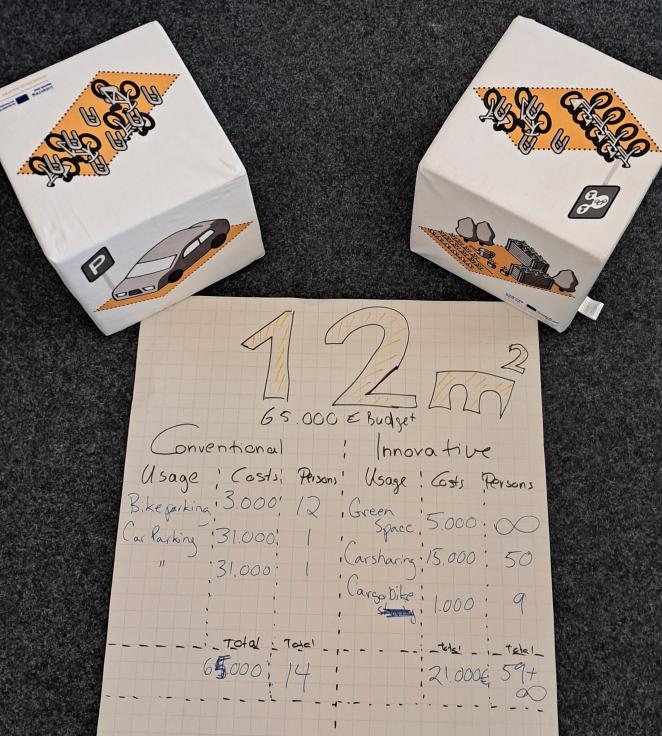Discussing "Shared Mobility" and the use of 12 m² with the City of Windhoek, Namibia.
The City of Bremen boasts a diverse range of international partnerships, but few are as unique and longstanding as its relationship with the City of Windhoek, Namibia which dates back to 1975. Bremen’s connection to Namibia is deeply rooted in both colonial history and the resulting responsibility, having also supported Namibia's independence movement in the 1980s. Even before Namibia gained independence in 1990, representatives and organisations from Bremen have been actively engaged in numerous collaborative projects.
Today, the focus of Bremen-Windhoek collaborations is on sustainability and climate change mitigation. Key initiatives include improving wastewater treatment and waste management systems, as well as planning for sustainable mobility with a strong emphasis on enhancing public transport systems and bicycle infrastructure. Urban development in the global north and south often follows different trajectories, and shared mobility might currently not be a viable option for many African cities, due to a lack of sufficient public transport systems and bicycle infrastructure.
However, a recent visit by the Mayor of Windhoek, Cllr. Queen Omagano Kamati, and eight other high-ranking delegates from Windhoek to Bremen brought fresh perspectives to these challenges. Cornelia Cordes and Rebecca Karbaumer from the unit of strategic transport planning at Bremen’s Ministry of Construction, Mobility and Urban Development, had the honour of showcasing Bremen’s European involvement and current projects, such as SHARE-North Squared, emphasising the integration of shared mobility into urban development projects in European cities.

During the visit, Cornelia highlighted the importance of transnational frameworks like the Green Deal and the Leipzig Charter on Sustainable Urban Development. She introduced various modes of shared mobility and demonstrated how these, strategically combined with public as well as active transport modes and coherent low-car urban planning—supported by Bremen’s innovative parking bylaw, the “Mobilitäts-Bau-Ortsgesetz”—can enhance sustainable urban mobility and contribute to the development of resilient, climate adaptive cities designed for people rather than cars.
The highlight of the session was the engaging dice game, "What Can You Do with 12m²?" The game features two dice. One represents the traditional, car-centric parking bylaws that dictate most new construction projects and offer limited (and expensive) requirements for developers. The other represents more flexible, modern mobility bylaws – like the one in Bremen – that provide developers with more options to meet the mobility needs of residents, tenants and buyers that go beyond car parking spaces (e.g. Carsharing-stations, bike-sharing, cargo bikes, bicycle parking, public transport and more). The 12m² represents the space required for one car parking space.

The delegates from Windhoek took on different roles while one representative rolled the dice on behalf of a hypothetical housing company with a budget of €65,000 for parking and mobility measures. They faced a choice: build traditional car parking or invest in sustainable and resilient options for the 12m². Predictably, the game’s outcome mirrored real-life scenarios. It took just three rolls to exhaust the available budget for parking using the car-centric parking bylaw, benefiting only 14 people with two car parking spots and one bicycle parking space for 12 bikes. Conversely, the innovative mobility bylaw resulted in significant benefits: over 59 people would be able to benefit from the options of the “implemented” green space, car-sharing parking and cargo bike infrastructure, with €21,000 of the overall budget left for additional developments.
The overarching message was clear: today's urban infrastructure decisions will shape city developments for decades let alone centuries. Cities in the global south have the unique opportunity to learn from the past mistakes of the global north for planning and building a more sustainable future.
An interesting note emerged during the session: Windhoek recently adapted its parking bylaw, inspired by Bremen’s previous parking bylaw for new real-estate developments, the “Stellplatzortsgesetz”, which allowed for the voluntary reduction of required car parking spaces if developers provided sustainable travel options for their tenants and buyers. This new bylaw now offers developers in Windhoek more flexibility and cost savings in new building projects.
Written by: Cornelia Cordes
